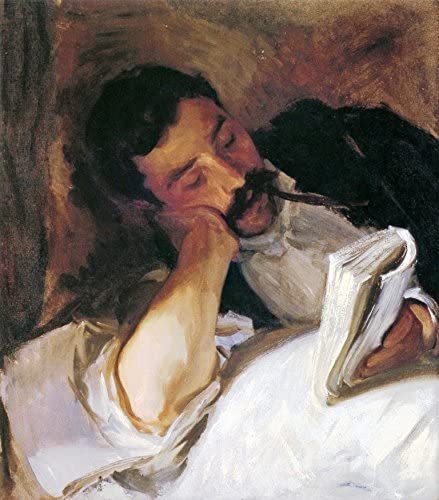Six Sonnets

Schopenhauer
These are days I think of Schopenhauer
who thought of life as Creation’s error
when from his high solitary tower
he could see no consolation in the fairer
sex or a good meal at the local pub.
Even these he could readily forego
for a comfy armchair and syllabub
to soothe the distempered mind. The warm glow
of intellectual sobriety
gave a kind of poetry to his prose,
a kind of sweet, reflective piety.
I confess these days I envy his repose.
He will not seek a dulcet fling or mood
for he is not alone in solitude.
.jpg)
Jealousy, Edvard Munch, 1895
Jealousy
I see him naked in the very bed
that I have shared with you these many nights
of coupled passion and love requited
as if no other sampled your delights.
And yet I can’t forget that he was here,
my predecessor, whom I envy more
than hate, as in a sonnet of Shakespeare
writhing with paradoxes, and deplore
my need to enter you as he once did.
I enter by his body as if his thrust
were mine, knowing it, putting in my bid
to be another and possess your lust.
This is my consolation and my myth.
I am the other you betray me with.

Nude Old Man in the Sun, Marià Fortuny, 1871
Requiem for Peenie
Not with a bang but a whimper
—T.S. Eliot
Civilizations die from suicide, not by murder
—Arnold Toynbee
Once proud and sagittal and priapic
and going where every man has boldly
gone before, now, falling on sciatic
times when he has grown flaccid and coldly
unresponsive to adventure, Peenie
flags, signaling the end of Western Civ.
What was large and mighty has grown weenie.
Now the prophets mourn. What! Shall this bone live?
Apparently not. I sing a requiem
for all that was majestic turned weak, ill,
and limp. Once it was us or them. Now, them.
The remnant grieve like old Ezekiel.
It’s over now, all vitality spent.
Peenie’s folded up like a camping tent.
.jpg)
Squelette arrêtant masques (detail), James Ensor, 1891
Dressed to Kill
I see them walk in every walk of life.
I see them earn their daily living wage.
I see them in the midst of tempered strife
or bloody outcomes where the foes engage.
I see them at the circus masquerade
and at the theaters where all applaud
to watch deception expertly displayed.
I see them grow indifferent to God.
I see them shopping at the local mall.
I see them glittering and confident.
I see them where they rise and where they fall.
I see them feral and irreverent
and know there is no “rather,” no “instead.”
The ghosts are dressed to kill. I see the dead.
Consciousness of Shock, Victor Brauner, 1951
Against the Grain
As when the sudden electric sickle
cuts through every independent thought
and the circuits, partly chemical,
scatter the tainted seed of neural rot
over the soil of the fertile spirit—
there is no help for decency or love
to work their blessèd will. This is where “it”
will undermine the thought I’m thinking of.
Well, that’s the nature and impediment
of errant scything and untimely blight
to take from meaning all that meaning meant.
The only course before synaptic night?
To lead one’s life against the inner grain
and let the mind do battle with the brain.
The Invisible Man, Salvador Dalí, 1932
Dolph McKenzie
“The collected poems of Dolphe McKenzie. Just what I wanted.”
“Who the hell?”
“Don’t know but we ain’t here for the poetry.”
—John Grisham, Camino Island
I’ve not read the poems of Dolphe McKenzie,
the reason being he doesn’t exist—
unless you’ve been reading up a frenzy
of second-raters who like to insist
they’ve been misprised or lost in the shuffle.
I know of such a one and do wish him
a slender chance to survive the scuffle
and live in the pages of John Grisham.
Oblivious to the contradiction
of being in the world and not being,
these Dolphes demand to live in a fiction
of accomplishment, unfortunate seeing
how they still produce their consummate tripe
like fruit that rots before it’s even ripe.

